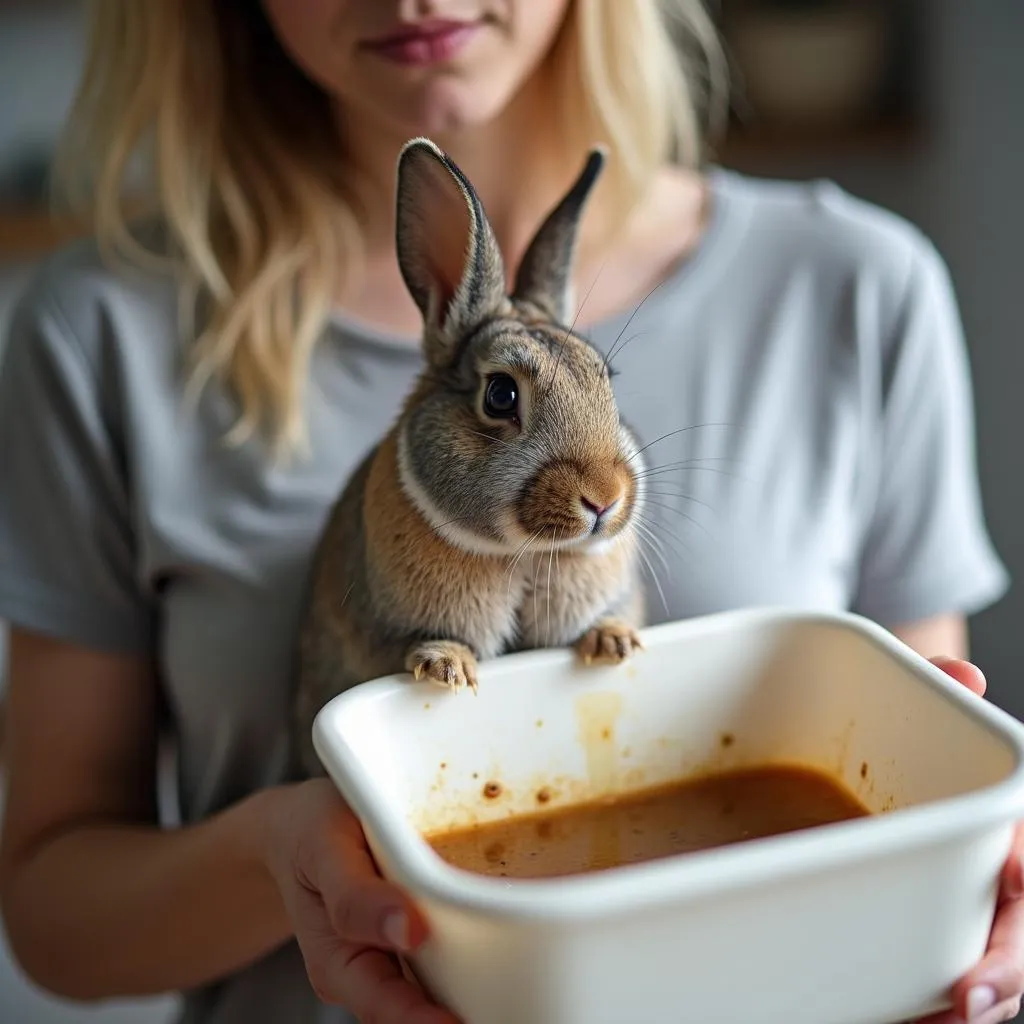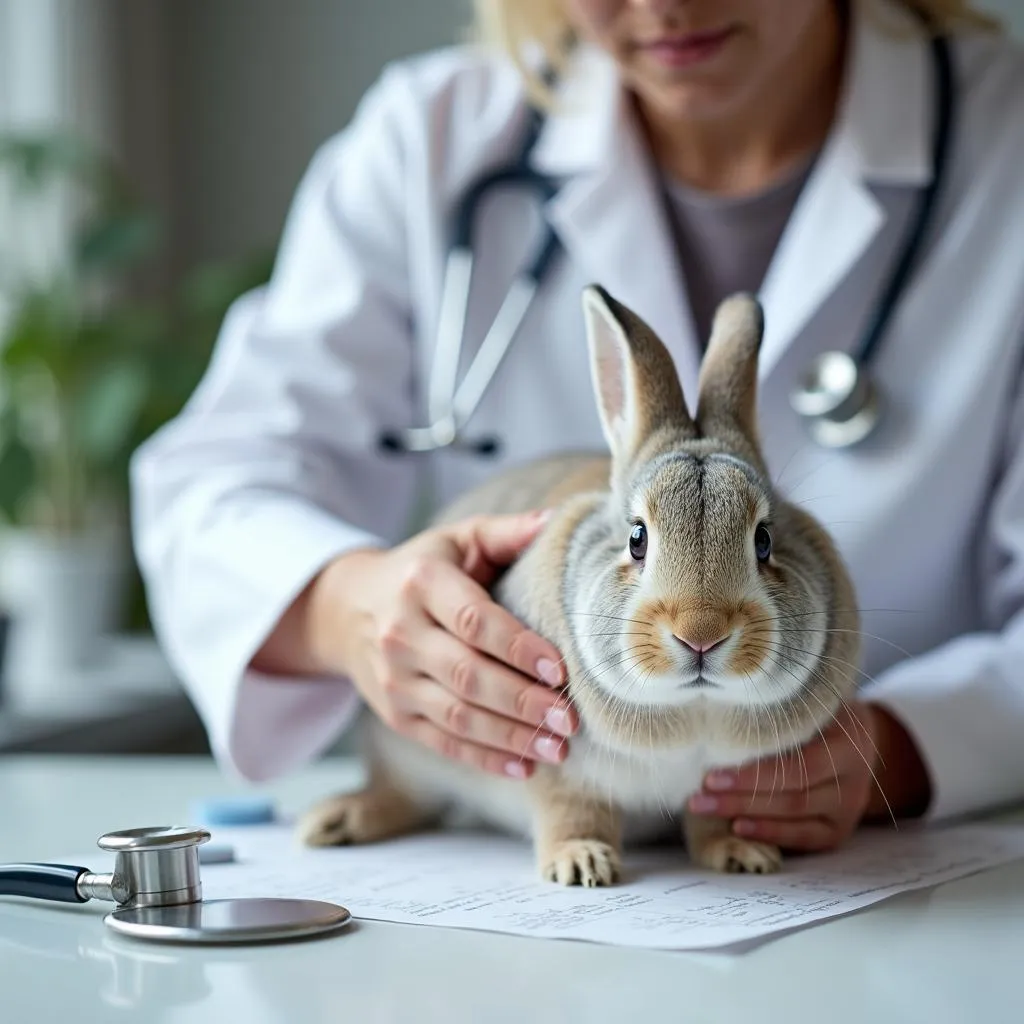Understanding the color of your rabbit’s urine is crucial for their health. While many new rabbit owners might assume rabbit pee is clear like a cat or dog’s, that’s not always the case. So, what color should rabbit pee be? Let’s delve into the colorful world of rabbit urine and what it means for your furry friend.
Decoding the Rainbow: Understanding Normal and Abnormal Rabbit Urine Colors
A healthy rabbit’s urine can range in color from clear yellow to a dark orange, even reddish sometimes. The variations are primarily due to plant pigments in their diet and mineral concentrations.
Normal Rabbit Urine Colors:
- Pale Yellow: This is the most common and desirable color, indicating good hydration and a balanced diet.
- Dark Yellow/Orange: This color is also generally normal, especially if your rabbit consumes a diet rich in carrots or other pigmented vegetables.
- Cloudy White: Don’t panic if you occasionally see cloudy white urine. This often indicates calcium excretion, which is normal for rabbits. However, persistent cloudiness could signal a health issue, so consulting your vet is recommended.
Abnormal Rabbit Urine Colors and What They Indicate:
- Red or Pink: This could be blood in the urine (hematuria), which is a serious concern and requires immediate veterinary attention.
- Brown or Black: These colors could indicate a severe health issue, like liver problems or internal bleeding. Consult your vet immediately if you see these colors.
 Rabbit with Brown Urine
Rabbit with Brown Urine
Factors Influencing Rabbit Urine Color:
- Diet: As mentioned earlier, pigments from vegetables like carrots, spinach, and dandelions can alter the color of rabbit urine.
- Hydration: Well-hydrated rabbits tend to have paler urine, while dehydration can lead to darker, more concentrated urine.
- Medications: Certain medications can also change the color of rabbit urine.
- Underlying Health Conditions: As discussed, changes in urine color can be a sign of urinary tract infections, bladder stones, or other health problems.
When to Consult a Vet:
While slight variations in your rabbit’s urine color are usually nothing to worry about, some changes warrant a trip to the veterinarian:
- Blood in the Urine: This is always a red flag and requires immediate veterinary attention.
- Straining to Urinate: If your rabbit seems to be struggling to urinate, it could be a sign of a urinary blockage.
- Frequent Urination or Increased Thirst: These could indicate a urinary tract infection or other health problems.
- Loss of Appetite or Lethargy: These are general signs of illness and should always be checked by a vet, especially if accompanied by changes in urine color.
 Rabbit Undergoing Examination at Veterinary Clinic
Rabbit Undergoing Examination at Veterinary Clinic
Keeping Your Rabbit Healthy:
- Provide Fresh Water Daily: Ensure your rabbit has access to fresh, clean water at all times to stay hydrated.
- Offer a Balanced Diet: A diet rich in hay, fresh vegetables, and a limited amount of pellets is crucial for your rabbit’s overall health, including urinary health.
- Monitor Urine Output: Keep an eye on your rabbit’s urine output for any changes in color, frequency, or smell.
- Schedule Regular Vet Checkups: Regular veterinary checkups are vital for catching potential health issues early on.
Conclusion:
Observing your rabbit’s urine color can offer valuable insights into their health. While normal variations are common, any drastic or sudden changes, particularly blood in the urine, warrant immediate veterinary attention. By staying informed and proactive, you can ensure your furry friend lives a long, healthy, and happy life. Remember, a healthy rabbit is a happy rabbit!
FAQ:
-
Q: My rabbit’s urine is sometimes orange. Should I be concerned?
- A: Orange urine in rabbits is often normal, especially if they eat a lot of pigmented vegetables like carrots. However, if the color change is sudden, persistent, or accompanied by other symptoms, consult your vet.
-
Q: How often should I clean my rabbit’s litter box?
- A: Ideally, you should spot-clean your rabbit’s litter box daily and completely change the litter at least once a week.
-
Q: Can I give my rabbit human medications for urinary problems?
- A: Never give your rabbit any medications without consulting your veterinarian. Human medications can be toxic and even fatal to rabbits.
-
Q: What should I do if my rabbit is straining to urinate?
- A: Straining to urinate is a sign of a potential urinary blockage, which is a veterinary emergency. Contact your vet immediately.
-
Q: How can I prevent urinary problems in my rabbit?
- A: Providing fresh water, a balanced diet, a clean living environment, and regular veterinary care are crucial for preventing urinary problems in rabbits.
Need further assistance with your rabbit’s health or have more questions? Contact our expert team at 0373298888, email us at [email protected], or visit our clinic at 86 Cầu Giấy, Hà Nội. We are available 24/7 to assist you.

